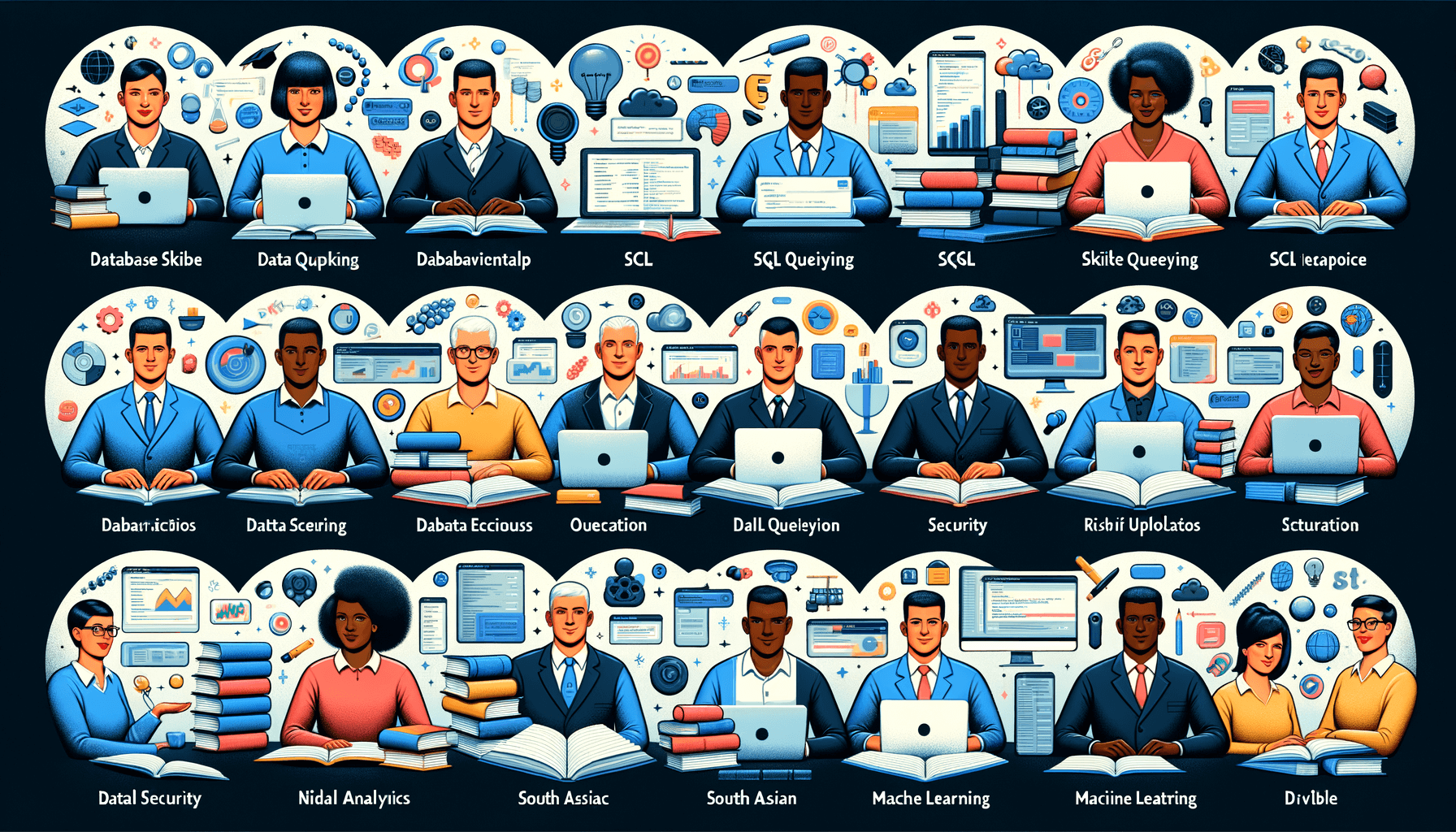A big variety of articles and resources

SQL is so easy to learn. Why is it so valued?
 Sia Author and Instructor
Learn SQL
Sia Author and Instructor
Learn SQL
13 minute read
SQL, or Structured Query Language, is a programming language used to communicate with and manage databases. It's known for its simplicity and power, making it a favorite tool for many. But why is SQL so important in the world of data? This article will explore the history, core concepts, and various uses of SQL, showing why it's so highly valued.
Key Takeaways
- SQL is a simple yet powerful language for managing databases.
- It has a rich history and has evolved over time to meet modern needs.
- SQL plays a key role in data management, business intelligence, and analytics.
- There are many resources available to learn SQL, from online courses to practical projects.
- Understanding SQL can open up many career opportunities in the tech industry.
The Historical Evolution of SQL
Origins and Development
SQL, or Structured Query Language, was born in the 1970s at IBM. It was created to manage and retrieve data stored in relational databases. The language quickly gained popularity due to its simplicity and effectiveness. SQL's design was influenced by the need for a standardized way to interact with databases.
Standardization Efforts
In the 1980s, SQL underwent significant changes to become a standardized language. Organizations like ANSI and ISO played a crucial role in this process. They established guidelines to ensure SQL's consistency across different database systems. This standardization made it easier for developers to learn and use SQL, regardless of the database platform.
Modern Implementations
Today, SQL is implemented in various database systems, including MySQL, PostgreSQL, and Microsoft SQL Server. Each system has its own extensions and features, but the core SQL commands remain the same. This widespread adoption highlights SQL's enduring value in the tech industry.
Fundamental Concepts of SQL
Data Definition Language (DDL)
Data Definition Language, or DDL, is all about setting up the structure of a database. We use DDL commands to create, modify, and delete database objects like tables, indexes, and schemas. Creating a table is one of the most common tasks, and it involves defining columns and their data types. For example, we might create a table for storing customer information with columns for ID, name, and email.
Data Manipulation Language (DML)
Data Manipulation Language, or DML, is used for managing data within the database. This includes inserting new records, updating existing ones, and deleting those that are no longer needed. When we want to add a new customer to our database, we use an INSERT statement. If we need to update a customer's email address, we use an UPDATE statement. DML is essential for keeping our data current and accurate.
Data Control Language (DCL)
Data Control Language, or DCL, focuses on permissions and access control. With DCL commands, we can grant or revoke user permissions to ensure that only authorized individuals can access or modify the data. For instance, we might grant a user permission to read data but not to delete it. This helps maintain data security and integrity.
Understanding these fundamental concepts of SQL is crucial for anyone looking to work with databases. They form the foundation upon which more advanced SQL techniques are built.
The Role of SQL in Data Management
Database Design and Modeling
In the world of data management, SQL plays a key role in designing and modeling databases. We use SQL to create tables, define relationships, and set rules for data. This helps us organize information in a way that makes it easy to find and use. Good database design is important because it makes sure our data is accurate and easy to manage.
Data Integrity and Security
SQL helps us keep our data safe and correct. We can use SQL commands to set rules that make sure data is entered correctly. For example, we can make sure that a phone number has the right number of digits. We can also use SQL to control who can see or change the data. This is important for keeping private information safe.
Transaction Management
When we make changes to a database, we want to make sure everything goes smoothly. SQL helps us manage these changes with transactions. A transaction is a group of actions that are done together. If one action fails, the whole transaction can be rolled back, or undone. This makes sure our data stays correct even if something goes wrong.
In our journey from zero to MySQL junior DBA, we learn how to handle real-world problems using SQL. This includes hands-on projects that give us practical experience and insights into the industry. The effort we put in is key to our success.
SQL in Business Intelligence and Analytics
Data Warehousing
In the world of data warehousing, SQL plays a crucial role. It helps us organize and store large amounts of data efficiently. SQL's ability to handle complex queries makes it ideal for extracting valuable insights from vast datasets. We can use SQL to create, update, and manage data warehouses, ensuring that data is always up-to-date and accurate.
ETL Processes
ETL stands for Extract, Transform, Load. These processes are essential for moving data from different sources into a single database. SQL is often used in ETL to extract data, transform it into a usable format, and load it into the target system. This ensures that data is clean, consistent, and ready for analysis. By mastering SQL, we can streamline ETL processes and improve data quality.
Analytical Queries
Analytical queries are used to analyze data and generate reports. With SQL, we can write queries that help us understand trends, patterns, and relationships within the data. This is especially important in business intelligence, where making informed decisions is key. SQL's flexibility allows us to perform a wide range of analytical tasks, from simple data retrieval to complex calculations.
By enhancing our SQL skills with advanced functions, sorting techniques, data handling, and analytical techniques, we can gain a competitive edge in BI.
SQL Versus NoSQL Databases
Structural Differences
When we talk about databases, we often compare SQL and NoSQL. SQL databases are structured and use tables to store data. Each table has rows and columns, making it easy to organize and retrieve information. On the other hand, NoSQL databases are more flexible. They can store data in various formats like documents, key-value pairs, or graphs. This flexibility allows NoSQL to handle unstructured data more efficiently.
Use Cases and Applications
SQL databases are great for applications that need complex queries and transactions. They are often used in banking systems, where data integrity is crucial. NoSQL databases shine in scenarios where we need to store large amounts of unstructured data. For example, social media platforms use NoSQL to manage user-generated content like posts and comments.
Performance Considerations
Performance is another key area where SQL and NoSQL differ. SQL databases are optimized for complex queries and transactions, but they can become slow when dealing with massive amounts of data. NoSQL databases, however, are designed to scale horizontally. This means they can handle large volumes of data and high traffic more efficiently. However, this comes at the cost of some features like ACID compliance, which ensures data reliability in SQL databases.
In summary, both SQL and NoSQL databases have their strengths and weaknesses. Choosing the right one depends on the specific needs of your application. For structured data and complex queries, SQL is the way to go. For flexibility and scalability, NoSQL is often the better choice.
Learning SQL: Resources and Strategies
Online Courses and Tutorials
To start learning SQL, online courses and tutorials are a great option. They offer flexibility and a wide range of topics. Websites like Coursera, Udemy, and Khan Academy provide courses that cater to beginners and advanced learners alike. Interactive platforms like Codecademy allow you to practice SQL queries in real-time, which helps reinforce learning.
Books and Publications
Books are another valuable resource for learning SQL. They often provide in-depth explanations and examples. Some popular titles include "SQL for Dummies" and "Learning SQL" by Alan Beaulieu. These books cover everything from basic queries to advanced topics, making them suitable for all skill levels.
Practical Exercises and Projects
Hands-on practice is crucial for mastering SQL. Working on real-world projects or exercises can help you understand how SQL is used in various scenarios. Websites like LeetCode and HackerRank offer SQL challenges that can help you improve your skills. Additionally, creating your own database projects can provide practical experience and deepen your understanding of SQL.
Common SQL Mistakes and How to Avoid Them
Syntax Errors
One of the most frequent mistakes we encounter in SQL is syntax errors. These errors occur when we type commands incorrectly. For example, missing a comma or misspelling a keyword can lead to a syntax error. To avoid these mistakes, always double-check your queries before running them. Using an SQL editor with syntax highlighting can also help catch these errors early.
Logical Errors
Logical errors happen when the query runs successfully but doesn't return the expected results. This can be due to incorrect conditions in the WHERE clause or improper joins. To prevent logical errors, we should carefully plan our queries and test them with different data sets. Understanding the data and its relationships is crucial for writing accurate queries.
Performance Pitfalls
Performance issues arise when queries take too long to execute. This can be due to inefficient query design, lack of indexing, or large data sets. To improve performance, we should optimize our queries by using indexes, avoiding unnecessary columns in SELECT statements, and breaking down complex queries into simpler ones.
It's essential to regularly review and optimize your SQL queries to ensure they run efficiently and return accurate results.
Advanced SQL Techniques
Subqueries and Joins
In SQL, subqueries and joins are essential for combining data from multiple tables. Subqueries, also known as nested queries, allow us to use the result of one query as a condition in another. Joins, on the other hand, enable us to merge rows from two or more tables based on a related column. Mastering these techniques is crucial for anyone looking to improve their data retrieval skills.
Window Functions
Window functions perform calculations across a set of table rows related to the current row. Unlike aggregate functions, they do not group the result set into a single output row. Instead, they provide a way to perform operations like running totals, rankings, and moving averages. These functions are invaluable for complex data analysis and reporting tasks.
Stored Procedures and Triggers
Stored procedures are precompiled collections of SQL statements that can be executed as a single unit. They help in reducing the amount of code sent to the database server, thus improving performance. Triggers, on the other hand, are special types of stored procedures that automatically execute in response to certain events on a table or view. Together, stored procedures and triggers play a vital role in automating tasks and ensuring data integrity.
By mastering advanced SQL techniques, we can significantly enhance our ability to handle complex queries and improve data retrieval, making us more effective in real-world applications.
The Future of SQL in a Changing Data Landscape
Integration with Big Data Technologies
As we move forward, SQL is increasingly being integrated with big data technologies. This allows us to handle vast amounts of data efficiently. SQL's adaptability makes it a valuable tool in the big data ecosystem. We can now query large datasets stored in Hadoop or Spark using SQL-like languages, bridging the gap between traditional databases and modern data processing frameworks.
Cloud-Based SQL Solutions
The rise of cloud computing has brought about a new era for SQL. Cloud-based SQL solutions offer scalability, flexibility, and cost-effectiveness. We can easily scale our databases up or down based on demand, without worrying about hardware limitations. Additionally, cloud providers offer managed SQL services, which reduce the administrative burden on our teams.
Emerging Trends and Innovations
The SQL landscape is continuously evolving with new trends and innovations. Some of the emerging trends include:
- Serverless databases: These databases automatically manage infrastructure, allowing us to focus on application development.
- AI and machine learning integration: SQL is being used to query and analyze data for AI and machine learning models.
- Real-time analytics: With advancements in SQL engines, we can now perform real-time data analysis, providing immediate insights.
The future of SQL is bright, with continuous advancements ensuring it remains a cornerstone of data management and analysis.
SQL Certification and Career Opportunities
Certification Programs
Getting certified in SQL can open many doors in the tech world. There are various programs available, each offering different levels of expertise. For example, the Zero to PostgreSQL Junior DBA course offers practical SQL training with real-world problem-solving. Instructor Eric Vanier provides expert guidance for career advancement in data management.
Job Roles and Responsibilities
With SQL skills, you can take on many job roles. Some common positions include Database Administrator, Data Analyst, and SQL Developer. Each role has its own set of responsibilities, but all require a solid understanding of SQL.
Industry Demand and Salary Trends
The demand for SQL professionals is high. Companies need experts to manage and analyze their data. This demand also means good salaries. Entry-level positions can start with decent pay, and experienced professionals can earn even more.
SQL certification can be a stepping stone to a rewarding career in data management. It not only boosts your resume but also equips you with the skills needed to excel in various roles.
Earning a SQL certification can open many doors in your career. Our courses are designed to help you master SQL and other advanced technologies. With the support of our expert instructors and AI-driven learning modules, you'll gain the skills needed to succeed. Ready to take the next step? Visit our website to explore our course offerings and start your journey today!
Conclusion
In summary, SQL's ease of learning combined with its powerful capabilities makes it a highly valued skill in the tech world. Its straightforward syntax allows beginners to quickly grasp the basics, while its depth offers advanced users the tools to handle complex data tasks. This unique blend of simplicity and power ensures that SQL remains a crucial tool for anyone working with data. As technology continues to evolve, the importance of SQL is likely to grow, making it an essential skill for the future.
Frequently Asked Questions
What is SQL and why is it important?
SQL stands for Structured Query Language. It's used to manage and manipulate databases. It's important because it helps in organizing and retrieving data efficiently.
Is SQL hard to learn?
No, SQL is considered easy to learn. With practice, you can get the hang of it quickly.
What are the basic commands in SQL?
The basic commands include SELECT, INSERT, UPDATE, and DELETE. These commands help you get data, add data, change data, and remove data from a database.
Can SQL be used with other programming languages?
Yes, SQL can be used with many programming languages like Python, Java, and C#. This makes it very flexible.
What are some common mistakes in SQL?
Common mistakes include syntax errors, like missing commas or misspelled commands, and logical errors, like wrong conditions in queries.
How is SQL different from NoSQL?
SQL databases are structured and use tables, while NoSQL databases can be document-based, key-value pairs, or graph databases. They are used for different types of data and applications.
Where can I learn SQL?
You can learn SQL through online courses, books, and tutorials. There are many free and paid resources available.
What jobs can I get with SQL skills?
With SQL skills, you can work as a database administrator, data analyst, or software developer. Many jobs in tech require knowledge of SQL.
Related Articles

Master SQL with Our Free Online Programming Course
8 minute read






